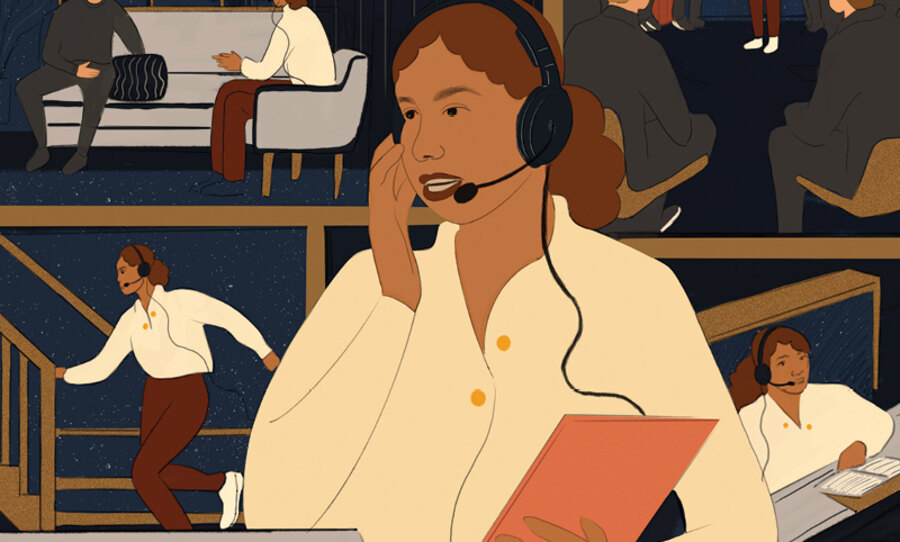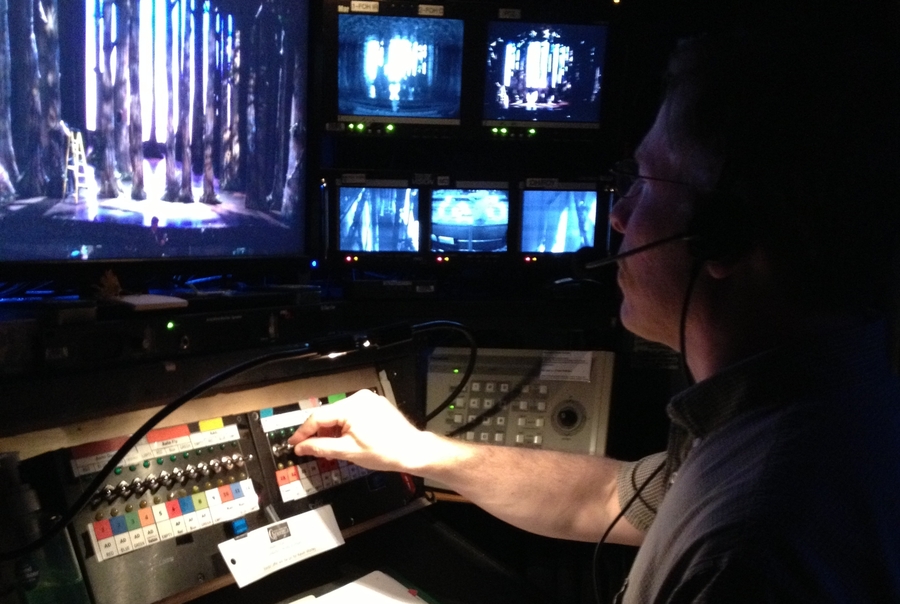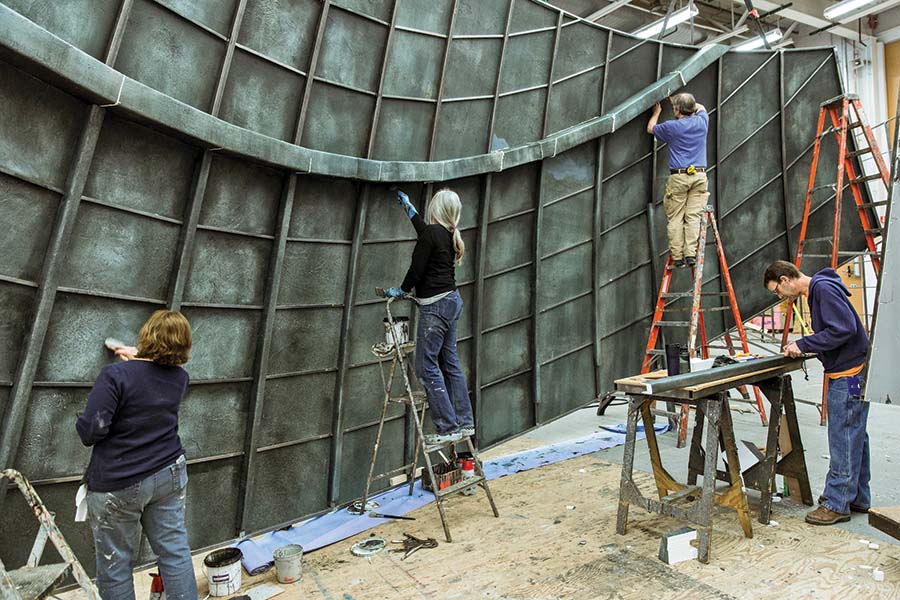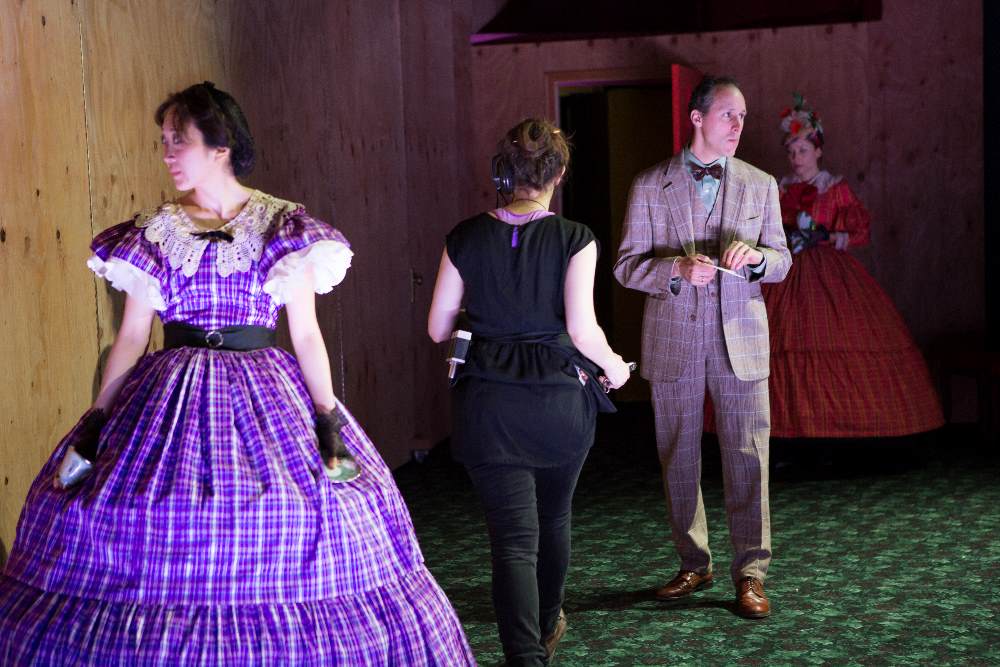In November 2022, Lisa Smith was weighing whether to continue stage managing or to scale up her part-time job at a gardening center into a full-time gig. She’d been stage managing in the Twin Cities for 20 years, 15 of those as a member of Actors’ Equity Association (AEA), when the forced break of the pandemic reminded her what a full night’s sleep felt like. When theatres opened again and she returned to stage management, she grew wary of some companies’ plans for reopening and their failure to create contingency plans for any personnel but performers. Understudies are great—but what happens if the stage manager gets Covid and there is no backup?
“We literally can’t call in sick,” she said ruefully. “We’ve all done shows puking in the booth.”
As the theatre industry has begun to recover from the pandemic, workers on- and offstage have been questioning the punishing norms built into the profession. As Jesse Green asked in an August 2022 article in The New York Times headlined “Shutting the Door on the Hard-Knock Life,” “Can the theatre…find a way to uphold [its workers] more holistically as humans, even as they continue to gut themselves every night?” Bound up in this question are legacies of racism and sexism that have always been part of the industry but which got a fresh spotlight after George Floyd’s murder in 2020 and the aftershocks of the #MeToo movement.
Stage managers often spend more time in rehearsal rooms and theatres than other workers, and it is their job to handle myriad interpersonal issues. Mythologized as unassailably capable people, stage managers have plenty to say about burnout, overwork, and the state of U.S. theatre in the post-Covid-lockdown era.
In conversations with 10 stage managers from around the country over the course of a year, they spoke about their career trajectories, working conditions, and the unique challenges of labor that’s not only invisible to the public but can also be opaque to those they work alongside. For some, the pandemic halted just-blossoming stage management careers. For others it meant choosing to leave solid careers in New York for more affordable cities. For a few, like Smith, the pandemic lockdown gave them a tempting glimpse of less demanding career paths. All found themselves reflecting deeply on the demands of life as a stage manager and its sustainability as a long-term career.
Evolution of a Job
Stage management as we now know it began to take shape only about a century ago. According to Jennifer Leigh Sears Scheier’s 2021 history of the profession, up until the late 19th century, directors and prompters guided theatrical productions in the United States. As theatrical styles shifted toward realism, the director began to assume more aesthetic control over productions, and the stage manager emerged as a figure in charge of technical production elements. Prompters continued to supply lines in rehearsal and call cues for actors in production. Eventually the director and technical director became distinct positions, and the stage manager assumed some of the prompter’s duties, along with production management.
Tracking changes in the stage manager’s title and job duties from the 1870s through the 1980s, Scheier’s research shows that while the role evolved significantly over a century, the job has always been ill-defined and nebulous, with the stage manager taking on duties that don’t strictly fall to anyone else. She attributes this in part to a historical lack of formal professionalization for stage managers, who are organized with Equity (a vestige of the days, nearly a century ago, when they also frequently performed as actors in shows they were working on).
The job has always been ill-defined and nebulous, with the stage manager taking on duties that don’t strictly fall to anyone else.
As productions became more technically complex over the 20th century, stage managers took on more responsibility for calling a larger number of cues and managing teams of workers. Stage managers once called shows from the wings, whereas many are now stationed in a tech booth, where they can see more of the stage picture.
The work didn’t only get more technical in this time, Scheier notes, writing, “The labor moved beyond technical know-how to a position where emotional intelligence became paramount to a job well done.”
Up until some time in the first half of the 20th century, stage managers were also predominantly men. It’s not clear who was the first recorded woman to serve in the role, but we do know that as late as the 1950s, female stage managers on Broadway were still rare enough to be newsworthy. Ruth Mitchell’s work on West Side Story was widely publicized in the New York press, though she already had more than a decade of work under her belt at that point. Coverage was also unsurprisingly sexist, with papers reporting information about her marital status, beauty, coloring, and weight.
Along with Mitchell, other notable women, such as Elaine Steinbeck, made careers as Broadway stage managers. Mitchell went on to become a prominent producer, working alongside Harold Prince on his projects until her death in 2000. By the early years of the 21st century, the vast majority of stage managers were women—a heartening development, though it brings with it new issues. Is it any surprise, after all, that a role often defined by its invisibility, and by catch-all job duties designed to help other people shine, has increasingly fallen to women?
Emotional Labor
“I am not your mother” was a resounding theme in the interviews I conducted. Even male-identified stage managers I talked to acknowledged that the job comes with the expectation of caretaking labor often associated with women.
Today stage management is one sector of the performing arts dominated by women, who made up between 66 and 71 percent of respondents to David McGraw’s Stage Manager Survey between 2006 and 2023, with those identifying as nonbinary hovering around 10 percent once the survey moved away from collecting gender data on a binary basis. In terms of backstage labor, the percentage of woman-identified workers is rivaled only by costume designers and technicians.
This trend only solidifies tropes about the job and perceptions of feminized labor. Stage managers are expected to withstand social slights and have the flexibility to maintain composure in unexpected situations. As “professional problem solvers” and “the hub of the wheel” of the production process, stage managers encounter a huge range of human behaviors from people in different parts of the theatrical hierarchy.
In the 1980s, sociologist Arlie Russell Hochschild coined the term “emotional labor” in her book The Managed Heart to describe the work of flight attendants, identifying it as work that “requires one to induce or suppress feeling in order to sustain the outward countenance that produces the proper state of mind in others.” Emotional labor, in other words, is the work of producing (usually positive) emotional performances, which may be at odds with true internal emotions, for the sake of those being served. Not coincidentally, flight attendants at the time were almost exclusively women serving largely male clientele.
Some stage managers I spoke with specifically invoked the term “emotional labor,” while others discussed the way gender dynamics influence their work. As one gay man of color from Minneapolis told me, stage managers are sometimes relied on implicitly as quasi-therapists or mental health experts, roles for which they are not trained.
“As a woman, personality management is built in—‘Like, oh my gosh, a man with an ego?!’ That’s absolutely part of everyday life, in all aspects of my life. It’s not just that I learned that at work; I learned that in my house with my brother!”
“Everybody likes a lady who has a lot of good ideas but doesn’t need to be in charge,” is how Victoria Rayburn (not her real name), a Washington, D.C., stage manager, put it. She even noted how her socialization as a woman has contributed to her success as a stage manager. “As a woman, personality management is built in—‘Like, oh my gosh, a man with an ego?!,’” she joked. “That’s absolutely part of everyday life, in all aspects of my life. It’s not just that I learned that at work; I learned that in my house with my brother!”
Lisa Smith also described her style as motherly, explaining that rather than using conflict or confrontation as strategies for getting people to do what she wants, she leverages “guilt and disappointment.” She never yells at people if they’re late; instead, she expresses concern and asks what she can do to help next time.
While this may be a successful approach to working with actors, Smith said she has encountered blatant hostility from backstage workers simply for being a woman in charge. On one show, she recalled, an all-female stage management team encountered a troubling degree of resistance from the all-male union backstage crew. Of one man in particular, she said, “I would speak to him and he would talk to someone else to tell me something—truly, a grown-ass man in his 60s who wouldn’t regard me as a human being.”
She laughed as she related this story, but noted more somberly that she regrets not reporting the behavior. (Both of her fellow stage managers did.)
Stage Management as an Art
But stage managers are not simply glorified babysitters or under- compensated human resources professionals. Most enter and remain in the field because of their affinity for the work onstage. As Smith put it, stage managers now “are not just a stopwatch.” As technology and culture have shifted over the past 30 years, “what a stage manager has to do has become more graceful. It is an art to do it well.” Said Rebecca Skupin, a stage manager in Houston, “I definitely consider myself an artist.”
Certainly stage managers need to understand basic dramaturgy, lighting, and theatrical timing to rehearse and call shows, but seldom are their artistic abilities recognized publicly. This may be changing: In 2021, Minneapolis-based Elizabeth MacNally won a prestigious McKnight Foundation Artist Fellowship for her work as a stage manager—the first time the organization has recognized stage management as an artistic practice in its own right.
MacNally worked frequently with the late director Marion McClinton at Pillsbury House Theatre in Minneapolis. By her account, McClinton’s approach to directing was to get out of the way of the story, and MacNally said she similarly sees herself “as a stage manager of the story. Are we getting in the way of the story? And if we are, how do we get ourselves out of that and get back to the story? The last thing we want to have happen is the audience gets smarter than us.”
Rosey Lowe, who had been working in Minneapolis and Chicago when we spoke, came to stage management from an acting background. They joked that rather than run a tight ship as a stage manager, they prefer to run rehearsals like a “very functional loose canoe.” The artistic process needs flexibility, she explained, because “you sometimes can’t plan for when a breakthrough is going to happen.”
Out of the Shadows
Still, aesthetic or otherwise, much stage management labor goes unrecognized.
“I am perfectly happy working in the shadows,” said Lyndsey Goode of Arlington, Texas, “except to the extent that networking is how you get your next gig.” Rayburn concurred on the double-edged sword of invisibility, saying, “If you are in theatre and you don’t know what a stage manager does, or at least what your stage manager does, you’re not appreciating the people you work with.”
Invisibility can also translate to monetary devaluation. As Goode pointed out, “A stage manager is never going to sell a ticket,” and on Broadway name recognition comes with more power to negotiate a contract. Ultimately, she said, any producer can decide “if you’re not going to take it for minimum, they can find somebody else who will.”
This may be why, partly enabled by Zoom communication, some stage managers have spent the past four years building collective knowledge and power. New York-based stage manager Amanda Spooner started the Year of the Stage Manager project in 2020, and the connections continue via a Facebook group.
Meanwhile there has been material progress: Houston’s Skupin, elected as one of Equity’s Western Region Stage Manager Councilors in 2022, sounded hopeful when we spoke in 2023, noting that contract negotiations included a number of gains for stage managers, including more ASM contracts, reduced workweeks and increased rest hours, and better overtime policies. Additionally, according to a request for proposal from 2023, the union is also taking steps toward a name change “inclusive of all its members.”
From their unique position as conduits, funnels, or hubs, stage managers naturally accrue responsibilities and knowledge. They are therefore ideally positioned to advocate for the culture of rehearsals to change.
In the meantime, they must also advocate for themselves. Goode left for the Dallas-Fort Worth area when gigs in New York dried up during the pandemic, eventually landing a job as a company manager for a ballet company in Dallas, a position in which she utilizes stage management skills and continues to work in the arts. MacNally left Pillsbury House Theatre for a position as the associate director of event production at the Walker Art Center, also in Minneapolis.
For her part, Smith is still on the fence about how much of her professional life she wants to devote to the theatre. She has stage-managed one show a year since we spoke in 2022, and is trying to strike a balance between work that simply pays the bills and work fueled by passion and creativity. She said she is working with a career counselor to help her sort through these decisions and launch her into her next chapter.
Whichever path she chooses, it will be her own.
“I can’t fix this industry,” she said. “There’s not time in my lifetime to make this better.”
Angie Ahlgren (she/her) is a writer based in Duluth, Minn., and owner of Ahlgren Consulting, LLC, a consulting and coaching business for academics in the arts. Research for this article was supported by a faculty fellowship with the Institute for the Study of Culture and Society at Bowling Green State University, and a short-term fellowship from the New York Public Library for the Performing Arts.
Support American Theatre: a just and thriving theatre ecology begins with information for all. Please join us in this mission by joining TCG, which entitles you to copies of our quarterly print magazine and helps support a long legacy of quality nonprofit arts journalism.





